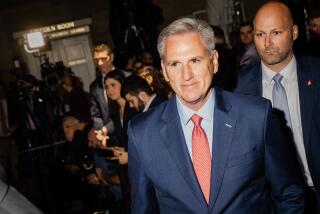U.S. Asks Debt Limit Above $2 Trillion
- Share via
WASHINGTON — The Reagan Administration today asked Congress to raise the national debt limit above $2 trillion, saying that without new borrowing authority the Treasury will be broke by Oct. 15.
John J. Niehenke, acting assistant Treasury secretary for domestic finance, told a Senate subcommittee that the requested debt limit change was “merely a recognition” of obligations already made by the government.
He asked that the Senate approve, without amendment, the $2.078-trillion debt ceiling the House adopted when it approved the fiscal 1986 budget on Aug. 1.
White House spokesman Larry Speakes said the Administration has contingency plans, as always, to shut down government agencies and “would be prepared to do so if there was not congressional action to raise the debt ceiling.”
But members of the panel made it clear the Senate will not approve additional debt without strings attached.
Sen. Steven D. Symms (R-Ida.) said he would consider leaving the debt limit where it is, “have the attorney general rule that (the President) can’t spend any money that he doesn’t have, and Congress could go home.”
Reserves Would Dwindle
Niehenke said the Treasury will reach the current debt limit of $1.824 trillion on Sept. 30, and its cash reserve of about $20 billion would dwindle quickly after that. By Oct. 15, he said, the coffers will be dry unless Congress acts.
The Administration estimates a debt ceiling of $2.073 trillion will be needed to meet government obligations in the fiscal year beginning Oct. 1, about $5 billion less than the new limit passed by the House. Niehenke said the Administration was supporting the House number to expedite the matter, since then the House would have to consider the matter again only if the Senate makes changes.
Niehenke told the Senate Finance subcommittee on taxation and debt management that more than $170 billion a year--more than half the money the Treasury collects in individual income taxes--is paid to the debt.
Several senators said that was “astonishing.”
Sen. Bob Packwood (R-Ore.), chairman of the Senate Finance Committee, said he would try to keep the debt limit from becoming a catch-all bill.
But, he said, “I’m not so naive to think this is going to make it to the floor and whisk on through.”
More to Read
Get the L.A. Times Politics newsletter
Deeply reported insights into legislation, politics and policy from Sacramento, Washington and beyond. In your inbox twice per week.
You may occasionally receive promotional content from the Los Angeles Times.









